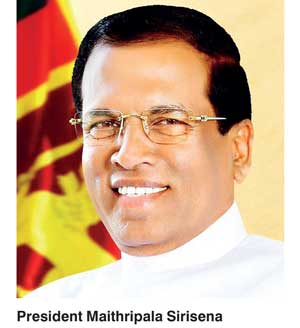Tuesday Feb 24, 2026
Tuesday Feb 24, 2026
Saturday, 10 June 2017 00:08 - - {{hitsCtrl.values.hits}}
Good governance activist Chandra Jayaratne has written to President Maithripala Sirisena on the assurance of good governance through the Interim Executive Orders – Saptha Aparihaniya commitments to good governance. Following is the text of the letter:
You have recently demonstrated your commitment to deliver on the promises made in seeking office as the President of Sri Lanka.
Many of the good governance commitments made as election promises, which are not yet effectively in place due to various reasons, can be brought in to force on an interim basis, pending formal review, reaching consensus and where necessary by the enactment of laws, regulations and adoption of appropriate codes of conduct and ethics.
You will recall that the edicts binding the Vajjians in Governance assured the welfare of all stakeholders of that society. The upholding of the principles pronounced by the Gautama the Buddha in the Saptha Aparihaniya Dhamma, led the way in statecraft of the Vajjian rulers and resulted in peace, stability, prosperity, welfare of citizens and assurance of good governance.
In terms of article 33 (2) (h) of the Constitution, quoted herein after, wide powers are vested in the President;
“In addition to the powers, duties and functions expressly conferred or imposed on, or assigned to the President by the Constitution or other written law, the President shall have the power – (h) to do all such acts and things, not inconsistent with the provisions of the Constitution or written law, as by international law, custom or usage, the President is authorised or required to do”.
In pursuit of the above article of the Constitution and in line with the desire to embed good governance principles in the practices, processes, procedures applicable in the management and administration of the executive functioning of the government, bound by Saptha Aprihaniya Commitments of Good Governance, it is proposed that you as the President, consider the issue of interim Executive Orders in writing (not formal gazette notifications), addressed to and binding;
1.The Prime Minister
2.The Cabinet
3.Ministers, as well as Deputy Ministers and State Ministers, as appropriate
4.Secretaries of Ministries, in their capacity as Chief Accounting Officers of the Ministries
5.The Heads of the Armed Services and the Police
6.The Attorney General
7.The Auditor General
requiring them to adopt such practices, processes, procedures as directed in the said Executive Order, in the management and administration of the executive functioning of the Government, with effect from a date so specified in the order.
If empowered by the Constitutional rights, even the;
8.Judges of the Supreme and Appeal courts
9.Constitutional Council members,
10.Heads of the Permanent Commissions appointed in terms of the Constitution
may be bound by the relevant Executive Order.
The undernoted are seven suggestions for inclusion in the first of such Good Governance assuring Executive Orders, binding all members referred to in 1-7 above, which you may consider issuing, whereby you require them to report to the Secretary to the President and the Secretary to the Cabinet;
1.Immediately, any incidents, acts or events connected with such persons, their immediate family members and key state officials reporting to them, which may negatively impact on the reputation, esteem and integrity of the government, the persons concerned and their direct reports; including but not limited to acts, issues and events which may tantamount to a noncompliance with laws and regulations of the country; or involves or appears to involve them in an illegal activity or a breach of any standard or binding code of conduct; or be an act of bribery, corruption, money laundering and terrorism financing, in terms of the applicable laws;
2.Immediately, annually thereafter and whenever a status change occurs in regard to prior declarations of the persons, their immediate family members and direct reports in relation:
3.Immediately, declare any conflicts of interests or potential conflicts of interests, which may arise in the course of exercising and functioning in office in relation to the persons, their immediate family members and direct reports,;
4.Immediately, declare any gifts, gratuitous payments, hospitality, entertainment and other perks and benefits, exceeding reasonable and modest levels permissible in normal course of operation, received in whatever form, directly or indirectly by the persons, their family members and their direct reports,;
5.Immediately, report any involvement or potential involvement with any offenses connected with insider information, market abuse and disclosure of any knowledge, decision or other information prejudicial to the interests of the State and any misrepresentation of information of any sort, involving the persons, their immediate family members and their direct reports;
6.Immediately, report any significant issues or events with a high probability and a high impact, of actual or potential losses or risks to the State; or an actual or potential control and compliance failure associated or impacting or likely to impact on any area of accountability of the person and their direct reports and connected to or associated with;
7.Immediately whistle-blow on any known significant wrongdoings, illegal activities, failures in control and compliance processes, and any acts of bribery, corruption, money laundering, financial crimes, waste, and nepotism such person ands and their direct reports are aware of
Where a governance culture, led from the top of the governance pyramid, encompassing the aforesaid seven self-declaration commitments, are embedded as a part of the governance structure of the State, a larger number of the election promises can be ensured to be effectively in place within the governance framework.
Wishing you all success with your endeavours of delivering on the good governance commitment.